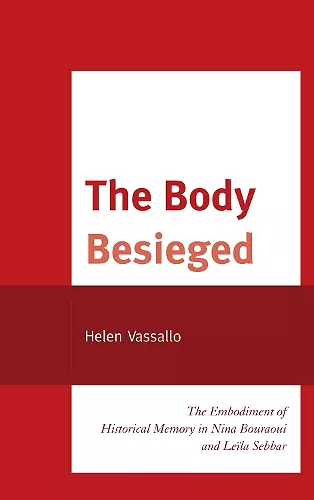The Body Besieged
The Embodiment of Historical Memory in Nina Bouraoui and Leïla Sebbar
Format:Hardback
Publisher:Lexington Books
Published:31st May '12
Currently unavailable, and unfortunately no date known when it will be back

The Body Beseiged: The Embodiment of Historical Memory in Nina Bouraoui and Leïla Sebbar by Helen Vassallo brings together the work of two important contemporary writers, Nina Bouraoui and Leïla Sebbar. Both authors embody a significant historical divide (they are half French and half Algerian), and each author’s work returns unfailingly to the legacy of opposition engendered by the colonial past that France and Algeria share: neither Bouraoui nor Sebbar claims any intention to write about the Algerian War of Independence, and yet its impact is felt throughout all of the texts chosen for discussion. This inescapable omnipresence of the Algerian War is conceptualized here as “embodied memory,” a corporeal impulse to write about a war whose legacy is transmitted to these “second-generation” writers rather than a conscious decision to engage with the historical aspect of their personal heritage. Both authors suffer a culturally imposed “de-territorialization” in their life and their early autobiographical narratives, and both subsequently undergo a voluntary “displacement,” undertaking literal and psychological journeys to map out routes towards a sense of self, of belonging, and ultimately of “re-territorialization.” However, the analysis reveals how this move from de-territorialization to re-territorialization is accompanied by a shift from internalization (through memory and silence) to externalization (via articulation and community): rather than using the individual as symbolic of the universal, Bouraoui’s and Sebbar’s life writing acknowledges that their experience begins with a universal, historical, or social context, and represents a personal act of remembrance which is key to the recovery of historical memory, and to the negotiation of an appropriate space for this memory. At a time of “reconciliation” and remembrance, the analysis exposes and probes open wounds in the Franco-Algerian relationship through a close focus on the autobiographical writings of two authors who embody both (hi)stories, and whose texts represent a site of this “embodied memory.”
Helen Vassallo’s perceptive comparative study of Leïla Sebbar and Nina Bouraoui reveals how both Franco-Algerian writers have used autobiographical introspection and historical inquiry into collective memory to transform a sense of ‘deterritorialization’ or exclusion from both communities, into ‘reterritorialization,’ new community connections that allow each to find her specific place in the world. This critical study is a must read for all students and scholars of postcolonial literature. -- Mildred Mortimer, University of Colorado
Fifty years on from France's multiply traumatic war of decolonization in Algeria, the fragmented memories and fractured identities generated by that conflict continue to exert a powerful influence on the lived reality of individuals and communities on both sides of the Mediterranean. As recent events in Toulouse have all too tragically illustrated, the personally embodied wounds of an unresolved colonial past still haunt contemporary Franco-Algerian relationships and mindsets. In this incisive new study, Helen Vassallo guides us insightfully and incisively through this contested political and cultural terrain. Her sensitive interrogation of the autobiographical writings of Nina Bouraoui and Leïla Sebbar thus charts a much-needed passage through the Franco-Algerian memorial labyrinth, revealing how individually embodied difference may offer an antidote to collective amnesia, and how new forms of self-knowledge may provide a solution to the communal displacements of the past. This new book is therefore as timely as it is necessary. It deserves to be widely read and is likely to be much discussed. -- Philip Dine, National University of Ireland, Galway and author of Images of the Algerian War: French Fiction and Film, 1954-1992
The Body Besieged represents a timely study of the works of two key Franco-Algerian women writers. Analyzing the textual embodiment of historical and autobiographical memory in their writings, Helen Vassallo produces a series of new and fruitful readings. -- Siobhan McIlvanney, King's College, London
Helen Vassallo provides us with a fascinating comparative analysis of two contemporary Franco-Algerian women writers, in an innovative and rich, yet very accessible and readable, study of a number of their recent autobiographical writings. The book covers an impressive range of topics—from the lived experience of exile and ethnicity to the role of language and the creative possibilities of writing—at the heart of which lie memory and identity, and the still difficult legacy of Franco-Algerian relations. In the current climate of strained ethnic relations in France and social and political change in North Africa, this is a very topical, important and interesting work to read, which should be of interest to a wide audience. -- Jo McCormack, University of Sunderland, UK
ISBN: 9780739171424
Dimensions: 234mm x 163mm x 18mm
Weight: 426g
180 pages